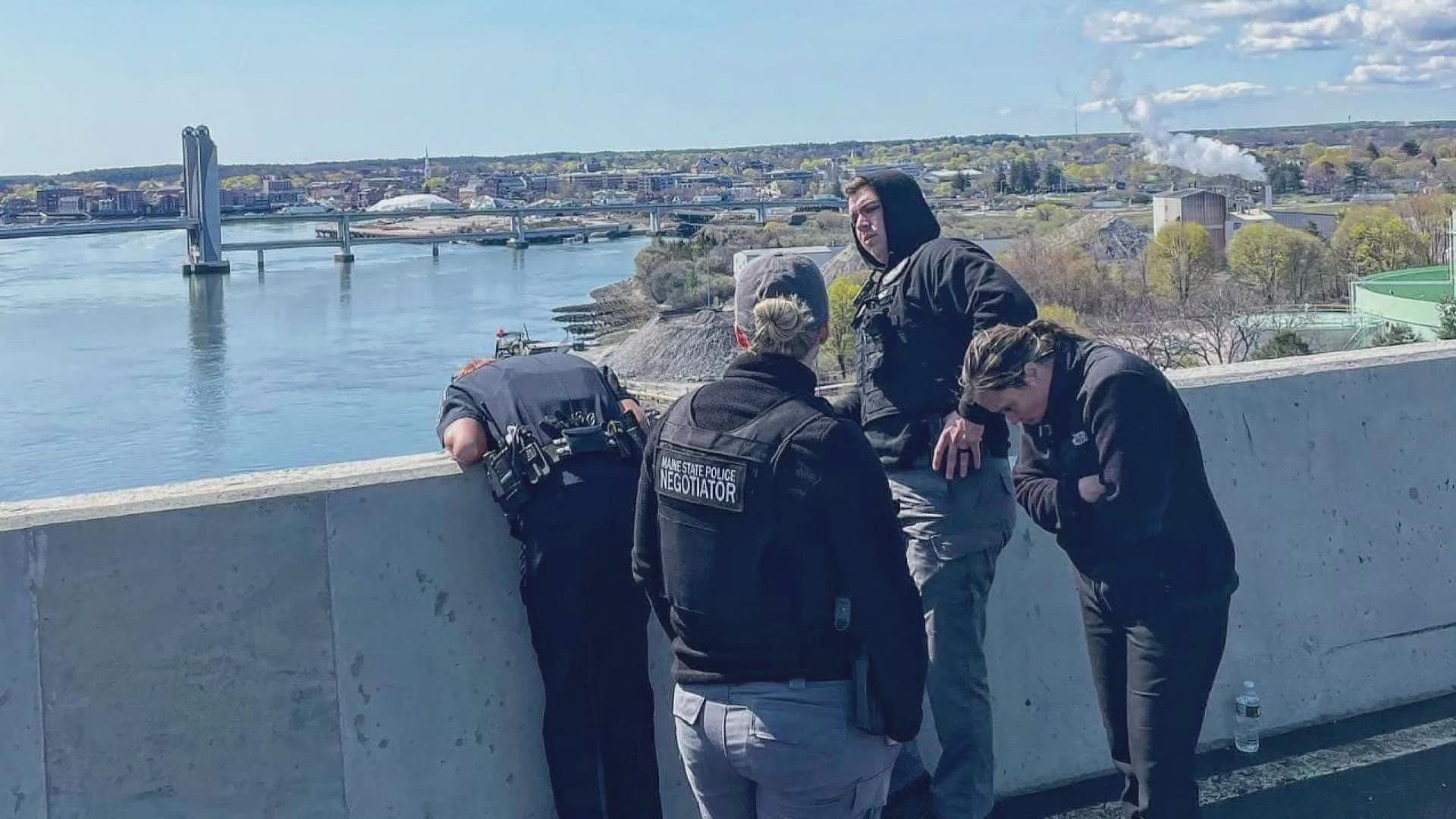PORTSMOUTH, N.H. — Rochelle Jones said the day started out like any other.
The Portsmouth police detective, who serves as the department's community outreach coordinator, was asked to post to the department's Facebook page on May 5, warning drivers on Interstate 95 that the Piscataqua River Bridge between New Hampshire and Maine was closed to traffic.
She did not ask a lot of questions. Maine State Police was handling the call.
Then Jones said she was called to the scene. A man on the bridge was in crisis and was threatening to jump.
"In my career, I have not been in that situation," she said. "There was no question. There was no discussion that this person's life was more important than closing traffic. It takes as long as it takes to save this person's life."
Cars on I-95 were at a standstill for hours as crisis negotiators, Maine State Police and others
One hundred thirty-five feet in the air, with police cruisers scattered across the bridge and Coast Guard boats in the river below, Jones said she did what anyone would do: She simply introduced herself to the man.
"I said, 'Hi! I'm Rochelle from the police department. You asked for me?'" she said. "For me, it was tuning everything out as if we were the only two people there."
There was a moment she said changed the whole interaction. Jones asked the man if he wanted a cigarette.
When he said yes, she said she had another officer hold onto her belt as she reached over the edge of the bridge and handed him the cigarette.
"He just reached up. He took it very softly and grazed my hand," Jone said. "We just looked at each other."
With that connection they were able to continue conversation, and eventually she said she was able to convince him to climb up a ladder.
He walked to her cruiser and got in. No handcuffs. No taser. No shots fires.
Jones said she and another officer took the man to a nearby hospital for treatment.
She admitted that not every mental health call involving police ends this way, though. In a way, she considers herself lucky.
Already this year in Maine there have been a number of deadly police shootings, many involving someone experiencing mental illness.
A report by the state's Deadly Force Review Panel released in February called for law enforcement agencies to implement specific plans on how to respond to mental health crises.
The panel reviewed 10 different cases from 2017-2020. It found 90 percent of them involved a person experiencing a mental health crisis.
"Officers right now are just struggling with identifying resources," Hannah Longley with NAMI Maine said.
The Maine chapter of the National Alliance on Mental Illness holds Crisis Intervention Team (CIT) trainings for police officers across the state.
The goal is to create a culture and network of resources and give officers the human tools they need to handle the toughest situations.
"We know that about a third of mental health crises in the state law enforcement is the primary responder to those calls," Longley said.
The pandemic has only made things worse.
According to Longley, department data gathered by NAMI Maine show some departments have seen as much as a 60 percent increase in mental health calls.
"We have departments that are fully invested in implementing [CIT] as a community-based program," she said. "We have other departments that struggle with having resources and capacity."
Fortunately in Jones's case, the training was there, and she used it.
"It can't be a power struggle," she said. "That day, and with someone in his situation, they hold all the cards."
Jones said in order for more situations to have a peaceful resolution and truly combat suicide, it is about more than training. It is about normalizing mental health.
"We have to fight that stigma," she said. "People have to feel comfortable asking for help."
At last check, the man, who NEWS CENTER Maine chose not to identify, is still getting the help he needs in a mental health facility.
Jones said she has stayed in touch and plans to meet up with him for lunch when he is back on his feet.
If you or someone you know is struggling and need help, you can call the Maine Crisis Hotline 24/7 at 1-888-568-1112.
More NEWS CENTER Maine stories

